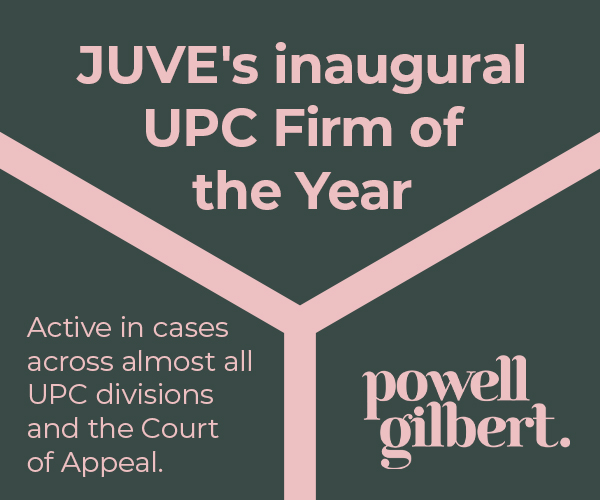Long arm of UPC extends to the UK
In a highly debated decision, the UPC has taken a stance on long-arm jurisdiction. In the dispute between Fujifilm and Kodak, the local division Düsseldorf stated that if the defendant is based in a UPC member state, the court has jurisdiction to hear the case regarding the UK part of the patent-in-suit.
29 January 2025 by Konstanze Richter
Fujifilm is currently suing Kodak at the UPC for infringing three patents protecting offset printing technology. The company has filed suit at the Mannheim local division for infringement of EP 3 511 174 and EP 3 476 616. These two lawsuits revolve around the surfaces of offset printing plates. Fujifilm has also filed suit at the Düsseldorf local division over infringement of EP 3 594 009. This case deals with the chemical components for the printing plates.
In the latter case the judges yesterday revoked EP 009 in the territory of all contracting member states in which the patent has effect and dismissed the infringement claim. Furthermore, they rejected an amendment of the patent requested by Fujifilm (case ID: UPC_CFI_355/2023). The judges panel comprised Berenice Thom, Rute Lopes, presiding judge Ronny Thomas and technically qualified judge Stefanie Parchmann.
An additional component of the case was whether the court is competent to hear the infringement case regarding the UK part of the patent.
German-British angle
The patent is in force in Germany and the United Kingdom. Fujifilm accuses Kodak of infringing its EP 009 with its plates Sonora X, Sonora Xtra-2 and Sonora Xtra-3. The Japanese patent holder requested the court order the US competitor to refrain from making or marketing these products within Germany and the UK. Kodak denies the infringement and filed a counterclaim for revocation.
Furthermore, Kodak argued that the UPC lacks jurisdiction over EP 009 insofar as it relates to the UK, given the UK is not a contracting member state of the UPC. Thus, with regards to the infringement claim regarding the UK, the defendant lodged a preliminary objection.
UPC claims jurisdiction
Initially, in January 2024, judge rapporteur Ronny Thomas had informed the parties that the court would deal with the preliminary objection in the main proceedings in light of the opinion of the Advocate General in BSH Hausgeräte GmbH vs Aktiebolaget Electrolux at the CJEU (case ID: C-339/22).
After this was published in September last year, Düsseldorf local division concluded that the outcome of the pending CJEU case is not decisive for the present dispute. The panel therefore dismissed Kodak’s preliminary objection as unfounded.
At the same time, the court declared that the UPC has jurisdiction to decide whether or not the UK part of European patents have been infringed, provided the defendant is based in a contracting UPC member state.
In its ruling the court states, “If the defendant is domiciled in a Contracting Member State (here: Germany), the Unified Patent Court has jurisdiction to hear the infringement action in respect of the UK part of the patent in suit. This also applies if the defendant has filed a counterclaim for revocation in respect of the German part of the patent in suit. Even then, as regards the infringement action concerning the United Kingdom, the Unified Patent Court has jurisdiction to hear the case.”
No ruling necessary
Nevertheless, in the present case the court did not actually decide on the infringement issue regarding the UK. Since the patent was revoked in the UPC territory, the judges reasoned that it is unlikely a British court would uphold the patent if a party were to challenge it in the UK. Currently there are no challenges to the patent.
The judges also stated that, “Even if the Court cannot decide on the validity of the UK part of the patent in suit, and certainly cannot revoke that part, the infringement action cannot be successful in such a factual and legal situation.”
To be continued
JUVE Patent does not know whether the parties will appeal.
Only last week, the local division Mannheim postponed its UK injunction ruling in the case of EP 174 due to the fact that the CJEU has not yet issued a final decision in BSH Hausgeräte against Electrolux (case ID: UPC_CFI_365/2023). In addition to the two other UPC proceedings at the local division Mannheim, a national case is still ongoing concerning the same offset printing technology. Fujifilm has sued Kodak at the Regional Court Düsseldorf for infringement of EP 3 511 173. Kodak has also joined a parallel opposition case at the EPO initiated by Agfa.
Fujifilm filed the three UPC lawsuits with the help of a Hoyng ROKH Monegier team led by litigators Tobias Hahn and Lars Baum. They worked in an international team together with Amsterdam-based partner Theo Blomme and Paris-based partner Amandine Métier. Associates Joscha Torweihe from Düsseldorf and Laurene Borey and Alix Fourmaux from the Paris office assisted.
Munich based partners Christian Hollatz and Claudia Schwartzkopff of patent attorney firm Ter Meer Steinmeister & Partner provided advice on technical matters.
- Lars Baum
- Amandine Métier
- Theo Blomme
Freshfields and Vossius & Partner have taken over the defence of Kodak. It is the first time Freshfields’ IP team has acted for the client, which came via one of the firm’s other practices. Düsseldorf partner Wolrad Prinz zu Waldeck und Pyrmont and senior associate Eva Acker took the lead in the case concerning EP 009. London partner Chris Stothers advised on the jurisdictional matter.
- Wolrad Prinz zu Waldeck und Pyrmont
- Nina Bayerl
- Christopher Stothers
Partner Nina Bayerl and associates Elena Hennecke and Caroline Horstmann are acting for the company in the two Mannheim proceedings. A patent attorney team from Vossius & Partner consisting of Natalia Berryman and Ursula Schnackenbeck is providing technical support for Kodak in all three proceedings. Vossius & Partner has filed patent applications on behalf of Kodak in Europe for years. However, the firm’s litigation team did not play a role this time.







